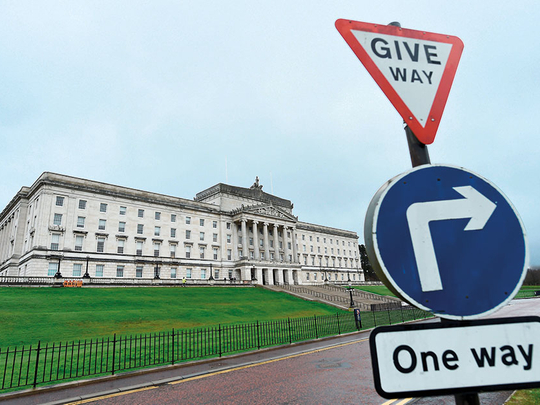
Driven by its headlong rush towards a clear-cut break with the EU, Britain appears to be entering one of its periodic fits of amnesia where the island of Ireland is concerned. Its insensitivity and lack of touch in managing the Scottish dimension of Brexit demonstrates that UK has a good deal to fear, even as the latest political deadlock over power-sharing in Northern Ireland threatens the re-imposition of direct rule from Westminster. Today we’re in the most dangerous period of the two decades since the Good Friday agreement.
The European Union, in 1998 seemingly a permanent reality, is embedded in the agreement. Whatever fears British voters had of a European superstate, the existence of an EU in which both the UK and Ireland were partners lessened the emphasis on the division between the two states (though the common travel area was in existence long before) and reduced the incentive to militate for a united Ireland. Northern Ireland’s existence may well be the result of the flawed agreements between the British government and the fledgling Irish Free State in 1920, but for the moment it is where we are.
Talk of the sectarian demographics of Northern Ireland changing (a bigger nationalist population outnumbering unionists) is one thing. But until the will of the Northern Irish people is otherwise, it is impossible to envisage it being subsumed peacefully into the republic, whatever logic Gerry Adams or I might ascribe, post-Brexit, to that endpoint. The Good Friday agreement was no stitch-up of the Provisional IRA by the UK and Irish governments. It was the product of years of inching forward and finding the formulations and language to see the scope for the next inch.
It was an exercise in methodical moderation and close attention to the detail of history and language. The political heroes of the peace process include names not normally associated with conspicuous acts of gallantry but rather with caution or political weaseling (or both): among them, Mayhew, Brooke, Major, Hume, Mandelson, Mallon, Trimble, Mowlam, Reynolds, Ahern and — yes, yes, thrice yes — Blair, assisted by officials and functionaries of the Irish and British governments, Sinn Fein and the other parties to the agreement.
It does not include Thatcher, Paisley, Adams, McGuinness or Ervine, or Corbyn or McDonnell. But when the historians (or the poets, who often hold the pen when it comes to Irish history) come to write this episode, they may have it differently.
The eventual installation of the extremists — Sinn Fein and the DUP — rather than more moderate factions as the winners in assembly seats was a price worth paying, though it may seem a perverse outcome to some. The assembly’s relative stability until recently was a marvel of design, incorporating institutionalised brinkmanship (“Be careful what you wish for; we can go back to rule from Westminster in a trice”) and behind-the-scenes fixes. Sinn Fein’s aspiration to a united Ireland has never been abandoned but became muted under the Good Friday agreement, which ingeniously packaged up an accommodation over the island of Ireland in the context of both countries’ membership of the EU. Now we’re in a different place.
Something will be required to replace the existing arrangements between the Republic of Ireland and Northern Ireland. Whether it is a single Ireland as part of the EU, a “soft” border between south and north (Ireland and Britain might quickly arrive at such an arrangement, but the rest of the EU, which has a stake, may be wary of it) or a hard border is yet to be hammered out. The last option is conceptually the simplest, but politically and practically the most perilous.
The optimal solution may lie in edging towards a united Ireland — but that would require a level of political courage not readily visible, as well as the stated will of the people of Northern Ireland. We cannot afford to have a UK government asleep at the wheel, driven by Brexit and internal Conservative party politics; preoccupied with Scottish independence; viewing this as a small local issue, easily ironed out; hoping that larger EU politics does not rule out a fudged compromise that sees free movement between the two countries; and smugly confident that something will turn up.
It may. Chances are it will. We may be grateful that Michel Barnier is the EU’s chief negotiator. We have reason to hope that a soft border will not become a bargaining chip. But Westminster would do well not to imagine that is the end of the matter. We have only to glance at the well-worn script that has played out to tragic effect so many times over the centuries to see what might come next. The UK leaving the EU will only increase demands for a single Ireland. The economic consequences would be the least of our worries. The perturbations that have led to the latest Northern Ireland assembly elections have more to do with Brexit and the threats and opportunities it presents than the deficiencies of any renewable energy scheme.
As nationalism generally stokes up once more, it is inevitable that Irish nationalism will as well. The new impetus given by Brexit to calls for Scottish independence will be watched vigilantly on the other side of the Irish Sea. It is for the EU, the UK and Ireland to come up with solutions. Britain in particular needs to take this very seriously if it wants to avoid not domestic inconvenience but existential concern. We need to remember the past and not be condemned to repeat it.
— Guardian News & Media Ltd, 2017







